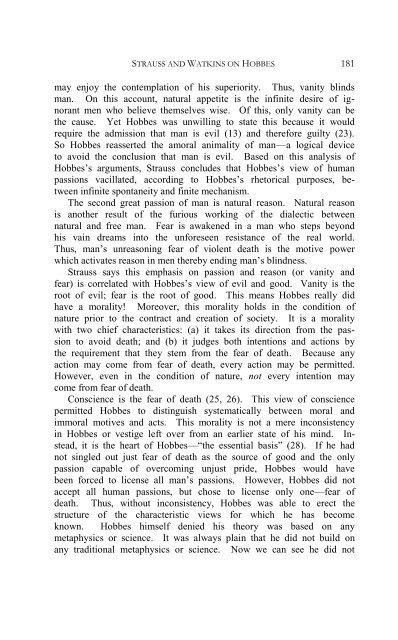Strauss and Watkins on Hobbes' Political Philosophy: A Review
Strauss and Watkins on Hobbes' Political Philosophy: A Review
Strauss and Watkins on Hobbes' Political Philosophy: A Review
You also want an ePaper? Increase the reach of your titles
YUMPU automatically turns print PDFs into web optimized ePapers that Google loves.
STRAUSS AND WATKINS ON HOBBES 181<br />
may enjoy the c<strong>on</strong>templati<strong>on</strong> of his superiority. Thus, vanity blinds<br />
man. On this account, natural appetite is the infinite desire of ig-<br />
norant men who believe themselves wise. Of this, <strong>on</strong>ly vanity can be<br />
the cause. Yet Hobbes was unwilling to state this because it would<br />
require the admissi<strong>on</strong> that man is evil (13) <str<strong>on</strong>g>and</str<strong>on</strong>g> therefore guilty (23).<br />
So Hobbes reasserted the amoral animality of man—a logical device<br />
to avoid the c<strong>on</strong>clusi<strong>on</strong> that man is evil. Based <strong>on</strong> this analysis of<br />
Hobbes’s arguments, <str<strong>on</strong>g>Strauss</str<strong>on</strong>g> c<strong>on</strong>cludes that Hobbes’s view of human<br />
passi<strong>on</strong>s vacillated, according to Hobbes’s rhetorical purposes, be-<br />
tween infinite sp<strong>on</strong>taneity <str<strong>on</strong>g>and</str<strong>on</strong>g> finite mechanism.<br />
The sec<strong>on</strong>d great passi<strong>on</strong> of man is natural reas<strong>on</strong>. Natural reas<strong>on</strong><br />
is another result of the furious working of the dialectic between<br />
natural <str<strong>on</strong>g>and</str<strong>on</strong>g> free man. Fear is awakened in a man who steps bey<strong>on</strong>d<br />
his vain dreams into the unforeseen resistance of the real world.<br />
Thus, man’s unreas<strong>on</strong>ing fear of violent death is the motive power<br />
which activates reas<strong>on</strong> in men thereby ending man’s blindness.<br />
<str<strong>on</strong>g>Strauss</str<strong>on</strong>g> says this emphasis <strong>on</strong> passi<strong>on</strong> <str<strong>on</strong>g>and</str<strong>on</strong>g> reas<strong>on</strong> (or vanity <str<strong>on</strong>g>and</str<strong>on</strong>g><br />
fear) is correlated with Hobbes’s view of evil <str<strong>on</strong>g>and</str<strong>on</strong>g> good. Vanity is the<br />
root of evil; fear is the root of good. This means Hobbes really did<br />
have a morality! Moreover, this morality holds in the c<strong>on</strong>diti<strong>on</strong> of<br />
nature prior to the c<strong>on</strong>tract <str<strong>on</strong>g>and</str<strong>on</strong>g> creati<strong>on</strong> of society. It is a morality<br />
with two chief characteristics: (a) it takes its directi<strong>on</strong> from the pas-<br />
si<strong>on</strong> to avoid death; <str<strong>on</strong>g>and</str<strong>on</strong>g> (b) it judges both intenti<strong>on</strong>s <str<strong>on</strong>g>and</str<strong>on</strong>g> acti<strong>on</strong>s by<br />
the requirement that they stem from the fear of death. Because any<br />
acti<strong>on</strong> may come from fear of death, every acti<strong>on</strong> may be permitted.<br />
However, even in the c<strong>on</strong>diti<strong>on</strong> of nature, not every intenti<strong>on</strong> may<br />
come from fear of death.<br />
C<strong>on</strong>science is the fear of death (25, 26). This view of c<strong>on</strong>science<br />
permitted Hobbes to distinguish systematically between moral <str<strong>on</strong>g>and</str<strong>on</strong>g><br />
immoral motives <str<strong>on</strong>g>and</str<strong>on</strong>g> acts. This morality is not a mere inc<strong>on</strong>sistency<br />
in Hobbes or vestige left over from an earlier state of his mind. In-<br />
stead, it is the heart of Hobbes—“the essential basis” (28). If he had<br />
not singled out just fear of death as the source of good <str<strong>on</strong>g>and</str<strong>on</strong>g> the <strong>on</strong>ly<br />
passi<strong>on</strong> capable of overcoming unjust pride, Hobbes would have<br />
been forced to license all man’s passi<strong>on</strong>s. However, Hobbes did not<br />
accept all human passi<strong>on</strong>s, but chose to license <strong>on</strong>ly <strong>on</strong>e—fear of<br />
death. Thus, without inc<strong>on</strong>sistency, Hobbes was able to erect the<br />
structure of the characteristic views for which he has become<br />
known. Hobbes himself denied his theory was based <strong>on</strong> any<br />
metaphysics or science. It was always plain that he did not build <strong>on</strong><br />
any traditi<strong>on</strong>al metaphysics or science. Now we can see he did not
















